Published Aug 30, 2014
Qualcomm Tricorder XPRIZE Announces 10 Finalists
Qualcomm Tricorder XPRIZE Announces 10 Finalists
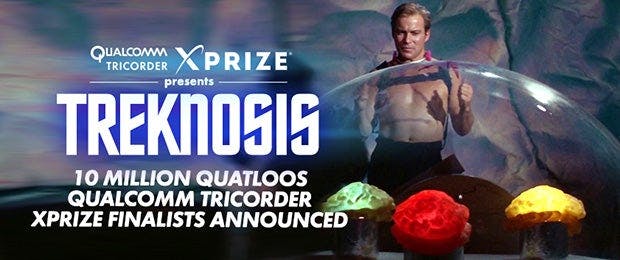
True gamesters and lovers of risk and reward, take note! The finalists in Earth’s $10M Qualcomm Tricorder XPRIZE have been announced. Tune your temporal scanners to the 21st Terran century and observe: a field of 22 worthy competitors has been narrowed to 10, only one of which can be crowned the ultimate victor. Their challenge: to create an affordable, portable, wireless scanning device not unlike the medical Tricorder currently used by doctors onboard Starfleet vessels. Limited to the technology of that era, the device must weigh no more than five pounds, be usable by everyday citizens, monitor five vital signs, and accurately assess 15 different medical conditions — a challenge well worth the $10 million prize purse, comparable to some 10 million quatloos.
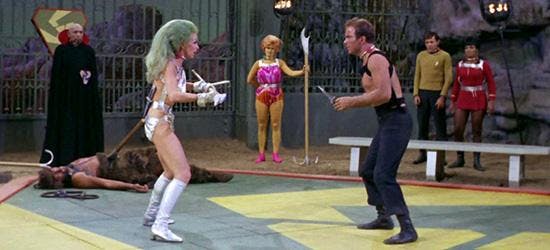
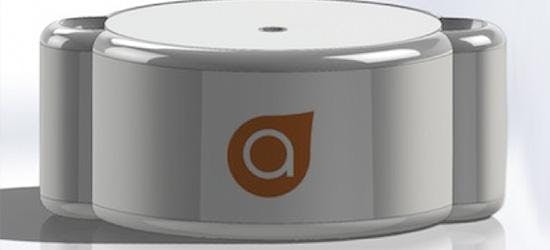
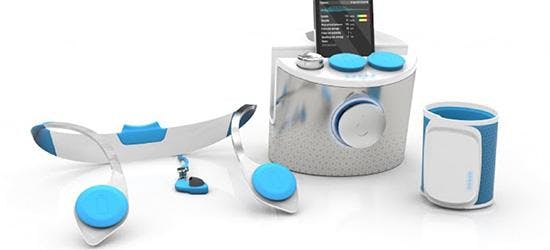
Danvantri (Chennai, India)
Team Danvantri derives its name from the god of Ayurvedic medicine who also serves as physician to the Hindu divine. Led by Sridharan Mani, Danvantri's members have over 200,000 man-hours of experience in IT and embedded systems. "We hope to create a platform for transforming healthcare, making health a part of individuals' daily lives, and helping everyone to stay healthy and fit independent of visits to clinics." Their current device, which incorporates all-in-one blood pressure, temperature, and pulse oximetry, is awaiting clinical trials; the next phase will see the integration of ECG and blood chemistry analysis, among other things.
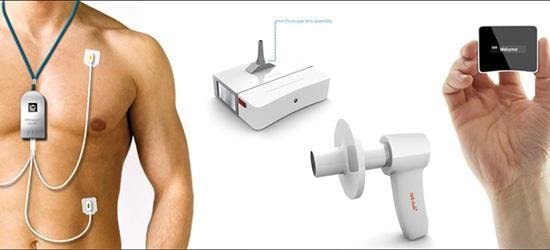
DMI (Cambridge, MA)Though it's not strictly part of the requirements, Team DMI's rHEALTH Sensor has already been tested in space. Dr. Eugene Chan, founder and president of the DNA Medicine Institute and holder of over 40 patents, may simply be thinking ahead. "We believe that fundamental change in medicine needs to be driven by advances in technology. In particular, we share the vision that consumers are the best advocates for their own health, and when empowered, will be able to take care of themselves in ways that we have yet to imagine. This will ultimately lead to lower healthcare costs, better care, and longer lives." The current version of the rHEALTH sensor is designed to assess hundreds of clinical tests using a single drop of blood or other bodily fluid.
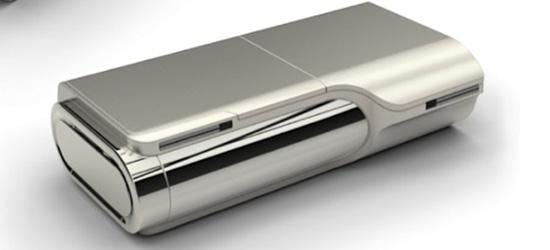
Dynamical Biomarkers Group (Zhongli City, Taiwan)The Dynamical Biomarkers Group hails from the Center for Dynamical Biomarkers and Translational Medicine at Taiwan's National Central University. Their leader, Chung-Kang Peng PhD, happens to be the NCU's Dean of Health Sciences and Technology, and has been working at the intersection of statistical physics and biology ever since grad school. Over the years, he and his collaborators have developed "several useful concepts and computational techniques, including the theory of physiologic complexity, and proposed the concept of dynamical biomarkers that can be utilized for disease diagnosis. These new approaches have a wide range of applications in multiple disciplines, such as mathematics, physics, economics, biology, and clinical medicine." Appropriately enough, the Dynamical Biomarkers Group includes a multidisciplinary team of clinicians, medical researchers, physicists, applied mathematicians, computer scientists and engineers.Final Frontier Medical Devices (Paoli, PA)A surprisingly high percentage of patients in an emergency room aren't in imminent danger; they're just looking for a timely diagnosis and advice on what to do next, and they've got nowhere else to go. As an ER doc with a PhD in engineering, Dr. Basil Harris and his team, Final Frontier Medical Devices, are ready to do something about that. Their solution is called DxtER ("Dexter") and combines a handheld sensor array with a tablet-based user interface and AI diagnostic engine capable of analyzing data, requesting further input, and arriving at a diagnosis. “I’m an ER doc; what I do every day is make diagnoses. That is my job boiled down to its core. I figure out, or at least try my best to figure out, what a patient's symptoms mean and what has to be done. Our device is smart and simple, giving people the help and answers they need when they need them the most."
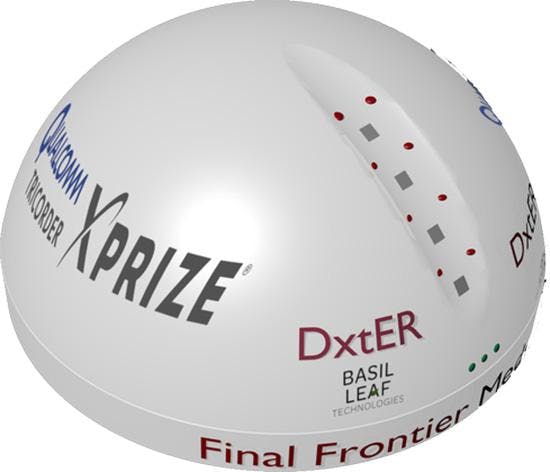
MESI Simplifying diagnostics (Ljubljana, Slovenia)
Straight out of Ljubljana, Team MESI Simplifying diagnostics combines members from Gigodesign, DLabs, the Jozef Stefan Institute, the University of Ljubljana, and MESI to form a Slovenian health technology powerhouse. Team leader Jakob Susteric founded MESI two years ago with the goal of creating medical devices that were reliable and easy to use, soon delivering a solution for diagnosing peripheral arterial disease. "We are proud to be one of the most successful startup companies in Slovenia and to be the youngest company in the country that has received ISO9001 and ISO13485 certificates. But we are the most proud of our goal to simplify diagnostics and bring it to a primary healthcare level, when there is enough time to react."
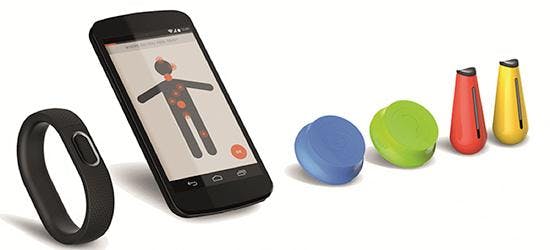
SCANADU (Moffett Field, CA)"Scanadu believes that our generation will be the last to know so little about our own health." Led by former MIT Media Lab sponsor and One Laptop Per Child exec Walter de Brouwer, Team Scanadu operates out of NASA's backyard in Moffett Field, nestled in the heart of Silicon Valley. The crowdfunding campaign for the Scanadu Scout broke Indiegogo's "most funded project" record at the time, and Scanadu has been featured in the New York Times, Wired, Forbes, and Fast Company among others — many, many others. You've probably heard of Scanadu. 'Nuff said.
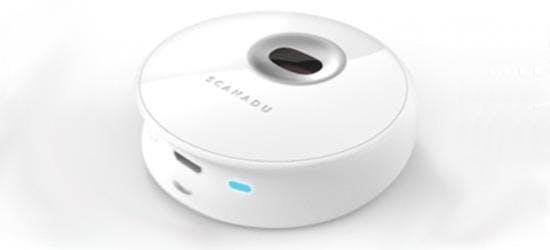
SCANurse (London, England)
Drawing on 20 years of experience working with pharma, biotech, healthcare and diagnostic companies all around the world, Anil Vaidya founded Team SCANurse with the belief that "the time is right for a change in the way personal medical diagnoses are handled." Holder of a master’s in biomedical engineering from Rutgers, Vaidya is current life science advisor to the office of the Mayor of London and has a unique understanding of how global partnerships can help bring his vision of the future of medical diagnostics to life.Zensor (Belfast, Ireland)Team zensor has been developing wireless, wearable, non-intrusive health monitors for a decade. Based at Intelesens in Belfast, Northern Ireland, zensor is led by chief technology officer Jim McLaughlin and has various partners in clinical diagnostics and cardiology. "Consumers have become more and more informed on their own health — wearable fitness technology has established a firm niche — however, to date, technology has not been capable of supporting true consumer healthcare needs. The zensor team is passionate about delivering cutting edge technology tested for both accuracy and safety to support this demand." zensor's current device incorporates ECG, motion, and respiration algorithms; their next version will measure blood oxygenation.
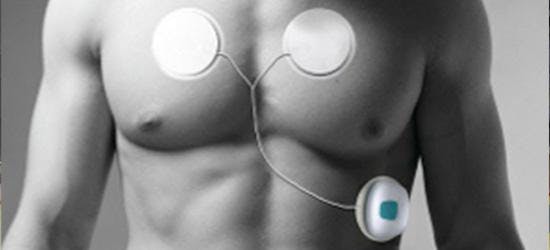
So stake your bets within the next half-interval: which team shall emerge victorious? According to records, the next phase is to begin in April 2015 with the delivery of device prototypes, followed by a rigorous consumer-testing period. Once your wagers have been placed, we will refocus our temporal scanners on early 2016 to see who claims the prize. These humans and their relentless innovative spirit provide much better sport than our former drill thralls. I congratulate myself for finding this loophole in the terms of our wager with Captain Kirk. Though we may be prevented from using humans in our games in the future, he said nothing of looking to the past to place bets on the outcomes of competitions there — a testament to my superior intellectual prowess! Make your wagers, fellow Providers: the betting floor is 10,000 quatloos.
_______________Provider 1 is one of the three primary Providers of the planet Triskelion in the M24 Alpha trinary system. Since the loss of their wager to Captain James T. Kirk of the USS Enterprise on stardate 3217.8, the Providers released their drill thralls from servitude and began a program of cultural enrichment due to last several hundred intervals. Provider 1 has been primarily focused on finding new ways to satisfy the Providers' need to gamble on the activities of other beings, and turned his considerable mental faculties toward the refinement of temporal scanners capable of observing discrete points in the timestream without altering its flow. Human history has turned out to be a significant source of entertainment for the Providers.XPRIZE is an innovation engine. We design and operate prize competitions to address global crises and market failures, and incentivize teams around the world to solve them. Currently, we are operating numerous prizes, including the $30M Google Lunar XPRIZE, challenging privately funded teams to successfully land a robot on the Moon’s surface, and the $10M Qualcomm Tricorder XPRIZE, challenging teams around the world to create a portable, wireless, Star Trek-inspired medical device that allows you to monitor your health and medical conditions anywhere, anytime. The result? Radical innovation that will help us all live long and prosper. Sign up today to join our mission, be a part of our campaign and win collectibles at: tricorderfederation.org.




